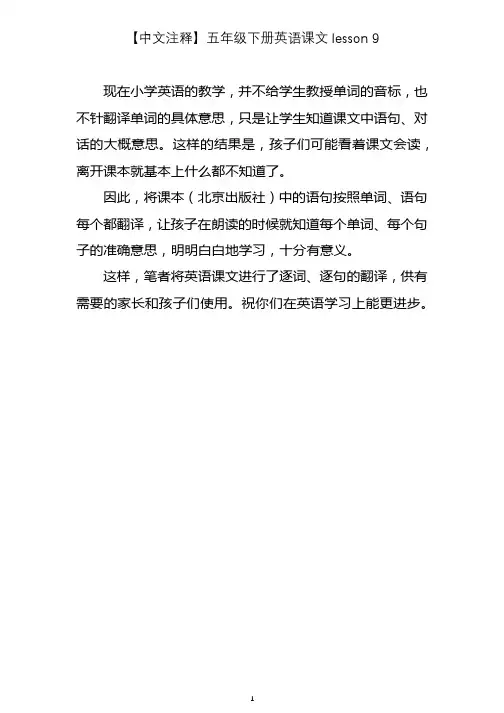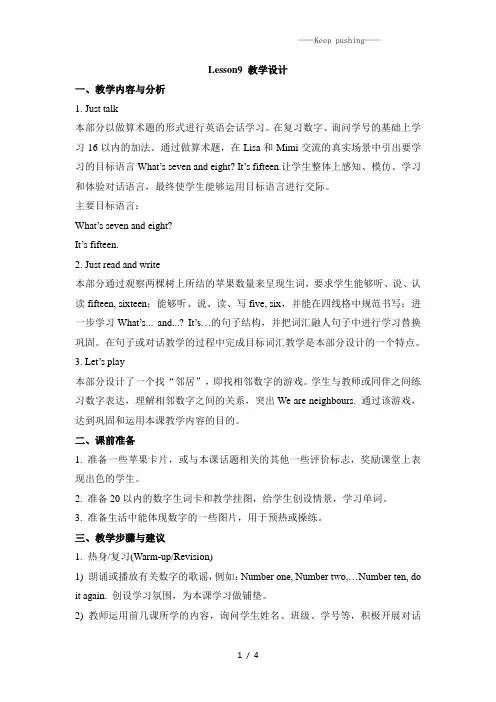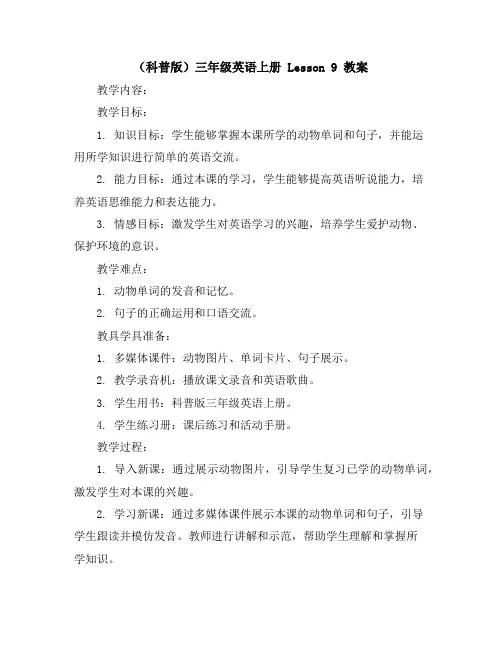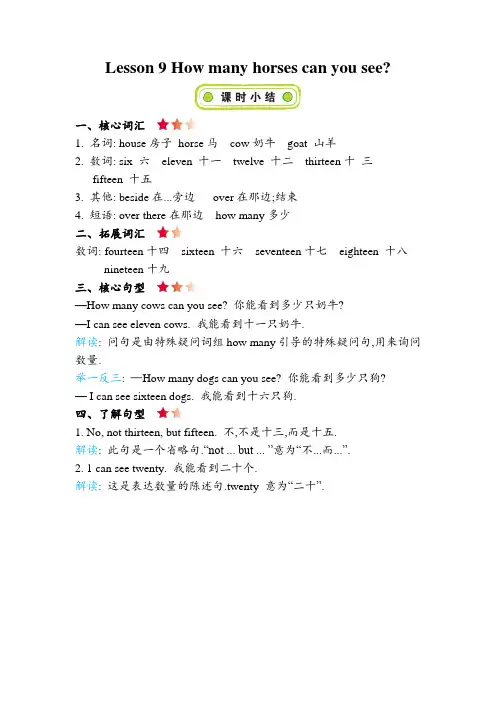Lesson 9
- 格式:doc
- 大小:68.00 KB
- 文档页数:12

Lesson 9 Were you at school yesterday?一、核心词汇1. 名词:June六月meeting会议,集会road路driver 司机word单词2. 动词:turn 转向,把....变成start 开始,动身3. 副词:yesterday昨天4. 兼类词:stop停止;(停车)站hard努力地;困难的5. 短语:sports meeting运动会二、核心句型—What was the date yesterday? 昨天是几号?—It was June 1. 昨天是6月1号.解读:问句是一个由what引导的特殊疑问句,用来询问过去的日期.was是is的过去式.句型结构:What + be动词(was)+ the date +过去的时间?回答:It was +月份+序数词.举一反三:—What was the date last Monday? 上个星期一是几号? —It was July 25th. 上个星期一是7月25号.—What was the date yesterday? 昨天是几号?—It was May 17th. 昨天是5月17号.三、了解句型1. Were you at school yesterday? 昨天你在学校吗?解读:这是一个一般疑问句,be动词提前,用来询问某人昨天是否在某地.句型结构:Be动词的过去式+主语+其他?举一反三:Was he at school yesterday? 昨天他在学校吗?Was she in the z00 yesterday? 昨天她在动物园吗?2. Did you have a good time? 你们玩得高兴吗?解读:这是一个一般疑问句,用来询问某人是否做了某事.句型结构:Did +主语+其他?举一反三:Did you go to school yesterday? 你昨天去上学了吗?3. How was your weekend? 你周末过得怎么样?解读:这是一个由how引导的特殊疑问句,用来询问某人怎么样. 句型结构:How +be动词+主语+其他?举一反三:How was your holiday? 你假期过得怎么祥?4. Are you good at fishing? 你擅长钓鱼吗?解读:这是一个一般疑问句,用来询问某人是否擅长某事.句型结构:Be动词+主语+good at+其他?举一反三:Are you good at dancing? 你擅长跳舞吗?。

【中文注释】五年级下册英语课文lesson 9
现在小学英语的教学,并不给学生教授单词的音标,也不针翻译单词的具体意思,只是让学生知道课文中语句、对话的大概意思。
这样的结果是,孩子们可能看着课文会读,离开课本就基本上什么都不知道了。
因此,将课本(北京出版社)中的语句按照单词、语句每个都翻译,让孩子在朗读的时候就知道每个单词、每个句子的准确意思,明明白白地学习,十分有意义。
这样,笔者将英语课文进行了逐词、逐句的翻译,供有需要的家长和孩子们使用。
祝你们在英语学习上能更进步。
1
Lesson 9 HOW DO SEEDS TRAVEL?
2。




Lesson9 教学设计一、教学内容与分析1. Just talk本部分以做算术题的形式进行英语会话学习。
在复习数字、询问学号的基础上学习16以内的加法。
通过做算术题,在Lisa和Mimi交流的真实场景中引出要学习的目标语言What’s seven and eight? It’s fifteen.让学生整体上感知、模仿、学习和体验对话语言,最终使学生能够运用目标语言进行交际。
主要目标语言:What’s seven and eight?It’s fifteen.2. Just read and write本部分通过观察两棵树上所结的苹果数量来呈现生词,要求学生能够听、说、认读fifteen, sixteen;能够听、说、读、写five, six,并能在四线格中规范书写;进一步学习What’s... and...? It’s…的句子结构,并把词汇融人句子中进行学习替换巩固。
在句子或对话教学的过程中完成目标词汇教学是本部分设计的一个特点。
3. Let’s play本部分设计了一个找“邻居”,即找相邻数字的游戏。
学生与教师或同伴之间练习数字表达,理解相邻数字之间的关系,突出We are neighbours. 通过该游戏,达到巩固和运用本课教学内容的目的。
二、课前准备1. 准备一些苹果卡片,或与本课话题相关的其他一些评价标志,奖励课堂上表现出色的学生。
2. 准备20以内的数字生词卡和教学挂图,给学生创设情景,学习单词。
3. 准备生活中能体现数字的一些图片,用于预热或操练。
三、教学步骤与建议1. 热身/复习(Warm-up/Revision)1) 朗诵或播放有关数字的歌谣,例如:Number one, Number two,…Number ten, do it again. 创设学习氛围,为本课学习做铺垫。
2) 教师运用前几课所学的内容,询问学生姓名、班级、学号等,积极开展对话表演或口语交际活动。
2. 新课呈现(Presentation)1) 教师呈现师生交流的情景,出现上数学课场景。



(科普版)三年级英语上册 Lesson 9 教案教学内容:教学目标:1. 知识目标:学生能够掌握本课所学的动物单词和句子,并能运用所学知识进行简单的英语交流。
2. 能力目标:通过本课的学习,学生能够提高英语听说能力,培养英语思维能力和表达能力。
3. 情感目标:激发学生对英语学习的兴趣,培养学生爱护动物、保护环境的意识。
教学难点:1. 动物单词的发音和记忆。
2. 句子的正确运用和口语交流。
教具学具准备:1. 多媒体课件:动物图片、单词卡片、句子展示。
2. 教学录音机:播放课文录音和英语歌曲。
3. 学生用书:科普版三年级英语上册。
4. 学生练习册:课后练习和活动手册。
教学过程:1. 导入新课:通过展示动物图片,引导学生复习已学的动物单词,激发学生对本课的兴趣。
2. 学习新课:通过多媒体课件展示本课的动物单词和句子,引导学生跟读并模仿发音。
教师进行讲解和示范,帮助学生理解和掌握所学知识。
3. 练习环节:学生分组进行练习,通过角色扮演、游戏等方式,巩固所学单词和句子。
教师巡回指导,纠正发音和句子错误。
4. 交流展示:学生分组进行英语交流,展示所学内容。
教师给予鼓励和评价,激发学生的自信心和积极性。
板书设计:1. 动物单词:cat, dog, fish, bird, elephant, tiger, panda, monkey。
2. 句子:I like cats. I don't like dogs. Do you like fish? Yes, I do. No, I don't.作业设计:1. 听力练习:听课文录音,跟读并模仿发音。
2. 口语练习:与同学进行英语交流,描述自己喜欢的动物。
3. 书面练习:完成课后练习和活动手册。
课后反思:本课通过展示动物图片、多媒体课件和教学录音机等教具,激发了学生对英语学习的兴趣。
通过分组练习和交流展示,提高了学生的英语听说能力和口语表达能力。
但在教学过程中,部分学生对动物单词的发音和记忆存在困难,需要进一步加强指导和练习。

Lesson 9 How many horses can you see?
一、核心词汇
1. 名词: house房子horse马cow奶牛goat 山羊
2. 数词: six 六eleven 十一twelve 十二thirteen十三
fifteen 十五
3. 其他: beside在...旁边over在那边;结束
4. 短语: over there在那边how many多少
二、拓展词汇
数词: fourteen十四sixteen 十六seventeen十七eighteen 十八nineteen十九
三、核心句型
—How many cows can you see? 你能看到多少只奶牛?
—I can see eleven cows. 我能看到十一只奶牛.
解读: 问句是由特殊疑问词组how many引导的特殊疑问句,用来询问数量.
举一反三: —How many dogs can you see? 你能看到多少只狗?
— I can see sixteen dogs. 我能看到十六只狗.
四、了解句型
1. No, not thirteen, but fifteen. 不,不是十三,而是十五.
解读: 此句是一个省略句.“not ... but ... ”意为“不...而...”.
2. 1 can see twenty. 我能看到二十个.
解读: 这是表达数量的陈述句.twenty 意为“二十”.。

Lesson 9 Don’t be late for class课文讲解1. I hope you’ll show them to me sometime.我希望某个时候你把它们给我看看。
[用法归纳](1)show 动词:展示;显示,短语show……to 把……拿给……看。
典例1Please show your homework ___ your partner.A. inB. onC. ofD. to解析: show 动词:展示;显示,短语show……to 把……拿给……看。
故选:D 句意:请拿你的作业给你的同桌看。
[变式演练]We will show it ____ you tomorrow.A. inB. onC. ofD. to(2)sometime 某时指在某个时间,不确定。
I met him sometime last winter. 去年冬天的某个时候我见过他。
[妙辨异词]sometime某时 some time 一些时候sometimes 有时 some times 一些次I gave him some books sometime last winter. 去年冬天的某个时候我给他一些书。
I have been to the Great Wall some times.我去过长城几次。
I often go to school by bike, sometimes on foot. 我常骑车上学,有时步行.He will stay in our school for some time.他要在我们学校呆一些时候。
典例2You may come to my home _______next Sunday. A. sometime B. some timeC. sometimesD. some times解析: A 根据句意可以判断此处用sometime某时。
句意:下周日的某个时候可以到我家。
Lesson 9Welcome .Hello, Sarah! Welcome back to London!vt.1. 欢迎The mayor welcomed the visiting guests at the airport市长到机场欢迎来宾。
2. 欣然接受She didn't welcome the suggestion.她不接受这项建议。
a.1. 受欢迎的She was a welcome visitor.她是个受欢迎的来宾。
3. 被允许的, 可随意使用的[F][(+to)][+to-v]You know you are welcome to stay.你知道, 我们欢迎你住下。
n.欢迎, 款待; 欢迎辞[C]He received a cordial welcome at Cambridge.他在剑桥受到了热诚的欢迎。
crowd n.1. 人群[C][G]There was a crowd of people in front of the town hall.市政大厅前有一群人。
3. 一堆, 许多[C]I saw a crowd of magazines and papers on her desk.我看见她桌上放着一堆杂志和报纸。
4. 大众[the S]You can do what you want to do, but never follow the crowd.你想做什么就做什么, 可别随大流。
vt.1. 挤满Passengers crowded the platform.月台挤满了乘客。
2. 将……塞进[O]He crowded more books onto the shelf.他向书架上又塞了一些书。
3. 催促; 催逼Don't crowd me, I'll pay.别催逼我, 我会付的。
vi.1. 挤, 拥挤[Q]People crowded into the cinema.人们挤进电影院。
新概念英语第二册参考答案lesson9新概念英语第二册参考答案Lesson 9Lesson 9 的标题是 "A cold welcome",讲述了一位名叫Vince Clare 的男子在寒冷的冬夜中,因为汽车故障而不得不寻求帮助的故事。
以下是本课的参考答案:A. 多项选择题1. a) He was going to repair his car.2. b) He was driving along a country road.3. c) He was going to visit a friend.4. a) He was afraid of being alone.5. b) He was afraid of the cold.6. c) He was afraid of the dark.7. a) He knocked at the door.8. b) He rang the bell.9. c) He shouted loudly.10. a) He was afraid that the man would not let him in.B. 填空题1. The weather was terrible.2. His car broke down.3. He had to stop.4. He couldn't go on.5. He was afraid.6. He was afraid of the cold.7. He was afraid of the dark.8. He was afraid of being alone.9. He saw a light in the distance.10. He walked towards the light.C. 完形填空1. a) afraid2. b) alone3. c) knocked4. d) answered5. e) cold6. f) welcome7. g) afraid8. h) warm9. i) afraid10. j) welcomeD. 翻译题1. 那天天气很糟糕。
Lesson 9Is It a Good Idea to Control Population Growth in the World?TextWhat Overpopulation Feels LikeWe moved slowly through the city in a taxi and entered a crowded slum district. The temperature was well over 100°and the air was thick with dust and smoke. The streets seemed alive with people. People eating, people washing, people sleeping. People visiting each other, arguing and screaming. People pushing their hands through the taxi windows, begging. People relieving themselves.People holding on to the sides of buses. People leading animals. People, people, people, people. As we drove slowly through the crowd, sounding the taxi's horn, the dust, heat, noise and cooking fires made it like a scene from Hell. Would we ever get to our hotel? All three of us were, I admit, frightened. Since that night, I've known what overpopulation feels like.Statistics show that rapid population growth creates problems for developing countries. So why don't people have fewer children? Statistics from the developed countries suggest that it is only when people's living standards begin to rise that birth rates begin to fall. There are goodreasons for this. Poor countries cannot afford social services and old age pensions, and people's incomes are so low they have nothing to spare for savings.As a result, people look to their children to provide them with security in their old age. Having a large family can be a form of insurance. And even while they are still quite young, children can do a lot of useful jobs on a small farm. So poor people in a developing country will need to see clear signs of much better conditions ahead before they will think of having smaller families. But their conditions cannot be improved unless there is a reduction in the rate at which population is increasing. This will depend on a very much wider acceptance of family planning and this, in turn, will mean basic changes in attitudes.II. ReadRead the following passages. Underline the important viewpoints while reading.1. Childless - and Happy That WayIn a country where most people believe that a family is not a family without children, some young couples, especially those with a higher education, have chosen to keep their families to two members -husbandand wife."I can't afford to have a child," said Wang, a promising research fellow with the Chinese Academy of Social Sciences.Wang has been busy travelling abroad and has received scholarship offers from a number of American universities that would enable him to complete his PhD."He is a free bird who may leave the nest any day and I've never cared much about a child," said Xiao Wei, Wang's wife, business representative of a French company in Beijing.Unlike the Wangs, Zhang and his wife have argued over whether they should have a baby."When we were married six years ago, we decided to adopt a wait and see attitude on the issue. And after a couple of years, my wife said she wanted to have a baby while I insisted we were just fine without one. We have been arguing about the matter ever since, and now that we are over 30, I think we're likely to end up in accordance with my wishes," said Zhang."There are many marriages that should have long been broken. People just hold on because a divorce would hurt the children most and the parents hate to face that prospect. So the couple sticks together and windsup torturing each other."A real happy family is a family that, without children, is still a happy family, said Zhang.Ma Jiang, who has opened a trading company and was instantly nicknamed Money Bags by his friends, said he would hate to be bothered with a child."To me, being without a child, I am less bound by household chores and can concentrate on my business. My lovely wife is all I need, no third person," he said.Ma's wife, Xiao Lu, working for a government unit, could have quit her job and become dependent on her "rich" husband. But she decided against it."I can't imagine what I would be like if I stayed at home, doing household chores and breast-feeding a child. I'd rather keep my independence at all costs," she said."Whatever people say, I believe that to have a child means a lot of sacrifice. We're just not ready for that, fun or misery," Ma's wife said. Hou Mingkun and his wife Luo Qian said they weren't against having a child, boy or girl, if only the baby was physically well developed. "One takes a risk when having a baby. I've heard too many stories about children born with physical defects. Since-t-here's no guarantee that thesame won't happen to my baby, I think I'd better not get myself involved. People say `no pain, no gain,' but for me it's no gain, no pain," Luo said.The couple were classmates in high school and went to the same university in Shanghai. Now, they are working for a computer company in Beijing.Those who choose not to have children have to overcome some unexpected difficulties in defending their stance.Influenced by the traditional view that one's worst sin is having no descendants, most people still accept that a wife is not a good wife if she doesn't have a child.Though few Chinese believe in an after-life, they do care a lot about growing old. For centuries, one of the purposes of having children, sons especially, was to have someone take care of the parents when they were old."Now, since both husband and wife are working, they will have a pension when they retire. What happens now is that the retired parents are supporting their adult children," Wang said."We're normal peop le, just like everyone else, We’ve just chosen to live our own way which harms no one. I hope people understand us," Wang said.2. Three Babies Are Born Every SecondThere are over 3, 800 million people in the world today, and the total is increasing at the rate of .more than 76 million a year. United Nationsexperts have calculated that it could be more than 7, 000 million by theend of this century.The population is growing more quickly in some parts of the world than others. The continents with the fastest growth rates are LatinAmerica (2.9 per cent) and Africa (2.6 per cent). Asia comes third (2.1per cent) but because its present population is so large it is there that byfar the greatest number of people will be added before the end of thecentury.3. Population Increase Has Wiped out the MaterialBenefits People Have AchievedMatthew:Sarah, is there a need to control population only in countrieslike India, Africa, Brazil. . . those countries that we call theunderdeveloped countries, or is there a case for limiting populationin Europe, for instance?Sarah:The reason one would have to limit population is because you're running out of food and you're running out ofresources. The people in Europe and America consume a fargreater proportion of the world's resources and the world's food thanthey do in India. So... um... population is directly related to...um... consumption and your general impact on the environment.If as an individual your impact is far greater than anybodyelse's, um... then that is the factor that's important, ratherthan how many people there are, or how many people can theworld support. Now it's...obviously in that sense, it's possibleto increase population if everybody's willing to e lessmaterial or eat less food, but it isn't if everybody's continuallywanting more and more and more, and this is... seems to he thetrend at the moment. . . higher and higher consumption. . . withat the same time a greatly expanding population. And the problemin ... um... areas which are poor and which have expandingpopulations is that they try and develop and try and...er...get...er...more materialbenefits, but as soon as they do this, the population increasehas wiped out any benefits that they may have um... achieved.Matthew:But do you feel that this battle with a...a rapidly expandingpopulation can be won?Sarah:The most sensible thing is to realize that you can't go on expanding human populations for ever and countries and individuals must decideto have a policy which would limit population.4. An African Woman Says: "...the Men Never Talk about It.""To us, children are the most important thing in life. When we marry, it is not above all to get a husband or wife, but to have children. I had mythirteenth birth only a few months ago, and most of my adult life I havehad to care for a baby as well as do all my other work in the house and inthe fields. For a long time I have wanted no more children, but I keephaving them as long as I am with my husband.A nurse comes to visit our village regularly. She holds meetings for allthe men and women together, to explain about family planning. Nowthese are well-known facts to us, but still nobody in our village practisesbirth control. When. We sit together with the nurse, everybody seems toagree that this is the right thing to do when a family had grown bigenough to give the parents security in their old age, and there are enoughhands to attend to all the daily work. But when we go home, the mennever talk about it. My husband and I attend every meeting, but in ourhome we have never talked about birth control. I desperately want to stophaving more children, but this can only be done if my husband suggestsit."5. Free Birth Control Techniques ShouldBe Available EverywhereMatthew:Peter, what sections of the population do you think free birth control techniques should be available to?Peter:They should be... available to all sections of the community er...things are getting to such a pitch that I personally thinkthat...er...not only should birth control methods be available to allsections of the community, but indeed should be compulsory. Thereshould be some kind of law which says that a family should not havemore than three children. A complete maximum of three children, ifthey have three children then they must be obliged by law, almost, touse birth control, if not have er... various kinds of operationwhich... um... make conception impossible.Matthew:But surely this is very er... explosive in social terms?Peter:It's very...it's a very totalitarian notion, but. thealternative...if we look around us in the world outside is millionsof people starving to death in places like India, and peoplesuffering from malnutrition in. . . in other parts of theunderdeveloped wor... world and indeed even in parts of the dev...socalled developed world.6. It's a World ProblemThe rapid rise in world population is not creating problems only for the developing countries. The whole world faces the problem that rawmaterials are being used up at an increasing rate and food productioncannot keep up with the population increase. People in the rich countriesmake the heaviest demands on the world's resources, its food, fuel andland, and cause the most pollution. A baby born in the United States willuse in his lifetime 30 times more of the world's resources than a babyborn in India. Unless all the countries of the world take united action todeal with the population explosion there will be more and more peoplefighting for a share of less and less land, food and fuel, and the future willbring poverty, misery and war to us all.7. What Has Caused the Population Explosion?The main reason is not so much a rise in birth rates as a fall in death rates as a result of improvements in public health services and medical care. Many more babies now survive infancy, grow up and become parents, and many more adults are living into old age so that populations are being added to at both ends. In Europe and America the death rate began to fall during the Industrial Revolution. In the developing countries of Africa, Asia and Latin America the fall in death rate did not begin till much later and the birth rate has only recently begun to fall.8. "The Rich Get Richer and the Poor Get Babies..."This sudden increase in the population of the developing countries has come at a difficult time. Even if their population had not grown so fast they would have been facing a desperate struggle to bring the standard of living of their people up to the point at which there was enough food, housing, education, medical care and employment for everyone to have a reasonable life. The poor countries are having to run faster and faster intheir economic activity in order to stay in the same place, and the gap in wealth between rich and poor countries grows wider every yearThe most pressing problem created by the rapid increase in population is a shortage of food. More mouths have to be fed every year, and yet a high proportion of the existing population are not getting enough of the right kind of food. Over the past two years the total amount of food has decreased, and of course the total amount of food per person has decreased even more sharply.More and more of the babies born in developing countries have been surviving infancy and now nearly half the people living in those countries are under the age of 15.The adults have to work harder than ever to provide for the needs of the children, who cannot contribute to the economy until they are older. There is a shortage of schools and teachers, and there are not enough hospitals, doctors and nurses. Farming land is becoming scarce, so country people are moving to the towns and cities in the hope of finding a better standard of living. But the cities have not been able to provide housing, and the newcomers live in crowded slums. Finally, there are too few jobs and unemployment leads to further poverty.。